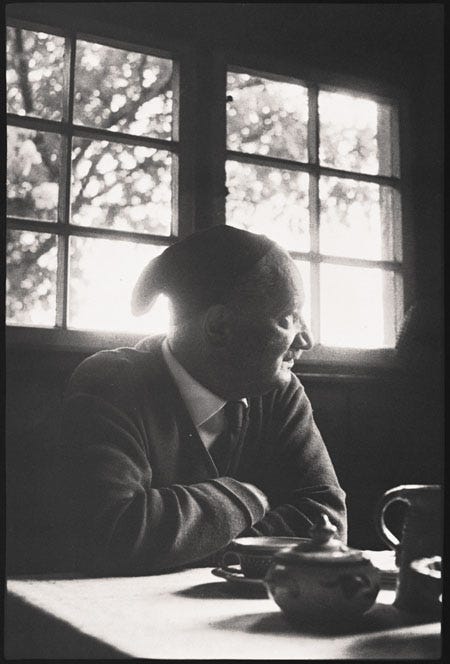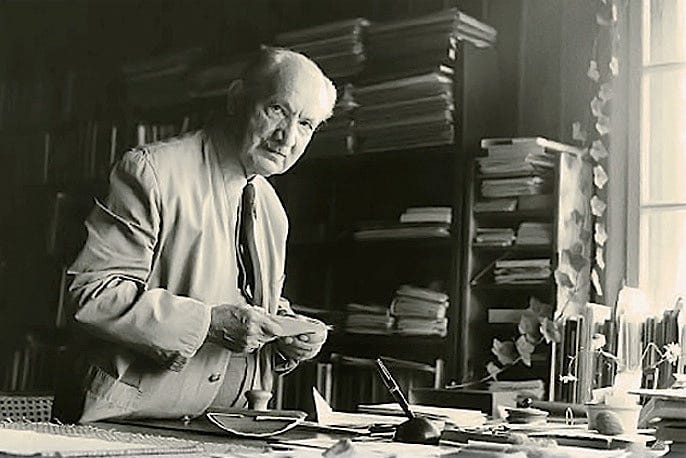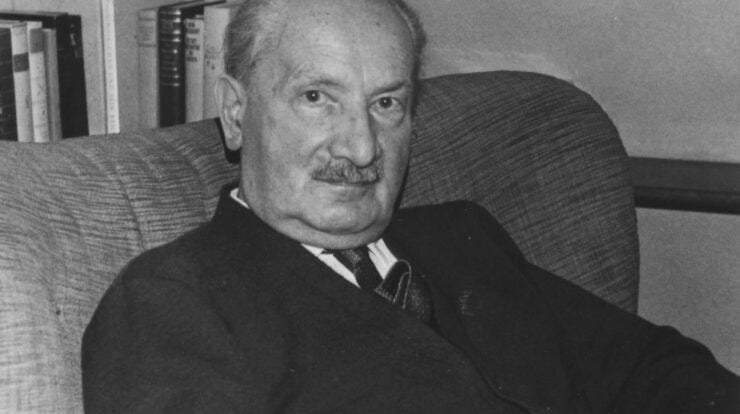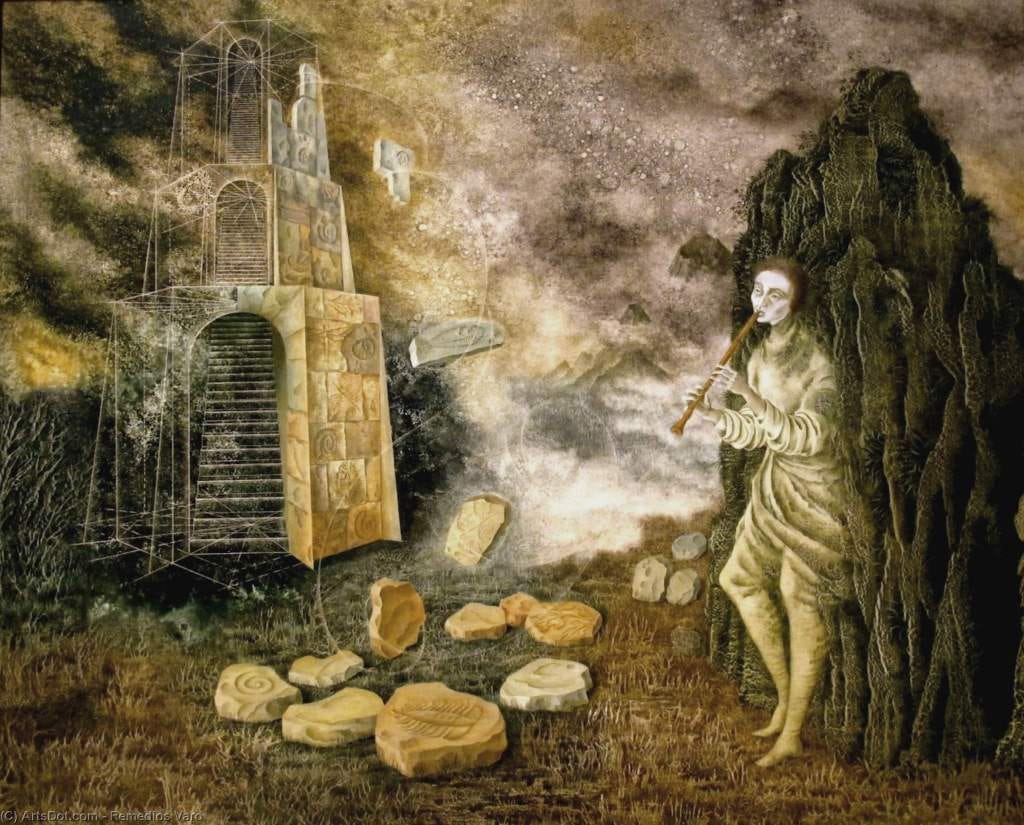Heidegger, Gestell, and the Illusion of Escape: How to Break Free from Modernity’s Cage
The Poet’s Revolt Against the False Escapes of Dugin and the Technocrats
Hey, Slick!
Recently I told you about Dugin, and before I tell you more about his Fourth Political Theory, we should look into one of his influences: Heidegger.
Heidegger was once very mistaken—he joined the Nazi party—and misunderstood ever after. So I'll try to do justice to his post-Nazism thought.

I. Heidegger and the Question of Being
Martin Heidegger’s central concern was Being (Sein) and our relationship to it. He saw modernity as fundamentally forgetful of Being, reducing existence to mere objects of manipulation. His later thought, particularly his concept of Gestell (enframing), describes how modern technology isn’t just a set of tools but a way of seeing the world that turns everything—including people—into raw resources for optimization.
To Heidegger, the essence of technology wasn’t technological. It wasn’t about machines or industry, but about a mindset: a way of revealing the world that blinds us to deeper, more authentic forms of existence (Dasein).
In simple terms, he argued that we’re trapped—not by machines themselves, but by a way of thinking that forces everything into a framework of control, predictability, and utility. He believed that this mode of thinking alienated us from Being and from our own authentic experience.
If Gestell is the perfect cage, then this is about those who think they’ve found the exits—only to reinforce the bars.
II. The Fourth Political Theory’s Mistake: The Myth of Escape
Aleksandr Dugin’s Fourth Political Theory (4PT) presents itself as a rejection of modernity. He claims to break with liberalism, communism, and fascism, positioning 4PT as an alternative rooted in tradition, mysticism, and anti-globalism.
But what does Dugin actually propose? He calls for an "existential revolution" against the West, often cloaking his ideas in Heideggerian terminology. He claims to seek Dasein—an authentic existence free from the control of modern technocracy.
Yet, Dugin's project isn’t really an escape from modernity. It’s just another Gestell—a reordering of power within the same technological framework. His fixation on geopolitics, civilizational struggle, and the manipulation of mass movements mirrors the same instrumental logic he claims to oppose. He isn’t breaking free from the system; he’s just shifting its center of gravity.
And this is where 4PT fails. You don’t just declare you’re outside the dialectic and expect history to respect your boundaries. That’s not how this works; that’s not how any of this works.
It’s a dialectic, Slick.
You don’t just decide that you’re the end of it. It happens. And when it does, it probably won’t ask for your permission.
By the way, this is exactly what Dugin critiques in Fukuyama’s End of History. He accuses liberalism of arrogantly declaring itself the final stage of political evolution, a post-ideological, total-liberalism era where history has effectively ended. But Dugin does the same thing in reverse. He claims his system is the final synthesis, that 4PT is the inevitable successor to modernity. In both cases, it’s the same mistake: mistaking a particular moment for the conclusion of the entire story.
III. The Technate: A Different Mask for the Same Entrapment
Now let’s shift to another false escape: technocracy.
Whether you look at figures like Peter Thiel, Elon Musk, or the advocates of a fully automated post-labor society, you’ll find a similar illusion of escape. The Technate—the vision of a society ruled by engineers, algorithms, and cybernetic systems—presents itself as a break from politics, inefficiency, and corruption.
But it’s just another version of Gestell.
The Technate promises total control over resources, decisions, and even human nature itself. It treats people as variables in a system to be optimized, reducing Being to mere inputs and outputs. The logic of technological enframing remains intact—it simply shifts from markets and nation-states to centralized digital systems.
Much like 4PT, the Technate doesn’t restore our relationship to Being. It intensifies our alienation. It is not an escape—it is the final enclosure.
IV. The True Problem: Gestell Precipitates the Event
Both Dugin and the technocrats misunderstand Heidegger in the same way:
Dugin believes he can escape modernity by returning to primordial roots, but he still operates within a framework of instrumental power.
The Technate believes it can optimize humanity out of its problems, but it only deepens our separation from Being.
Neither returns to Dasein. Neither breaks free from Gestell.
Heidegger believed that the only way forward wasn’t through political revolution or technological acceleration, but through The Event (Ereignis)—a moment where Being reveals itself again. This isn’t something that can be engineered or forced; it’s something that happens when we step back from the logic of total control.
Ironically, both Dugin and the technocrats may be precipitating The Event in ways they don’t understand. Their attempts at total control, total war, or total optimization will reach a breaking point—forcing the kind of rupture Heidegger foresaw.
V. What Comes After the Breaking Point?
If Heidegger was right, then the answer isn’t found in more systems, more control, or more grand ideological projects. The answer is in breaking the spell of Gestell—of refusing to see the world as a resource to be manipulated.
But what does that look like, Slick?
Here, we might turn to Jean Gebser and his Structures of Consciousness. Gebser mapped out the evolution of human perception, tracing how societies moved from the archaic to the magical, then to the mythic, the mental-rational, and, finally, toward something he called the integral. Each stage wasn’t just a new ideology but a new way of experiencing time, space, and Being itself.
If we’re truly to move past Gestell, we need something akin to Gebser’s integral—not a return to some romanticized past, nor an acceleration into a hyper-technological future, but an actual integration of what has been fractured. A new structure of consciousness that isn’t bound by instrumental rationality, political dialectics, or the logic of control.
And perhaps that’s why Heidegger turned to the poet.
Poetry doesn’t function like the left brain—it doesn’t analyze, dissect, or reduce. It doesn’t fit things into predefined categories. It sees through connection, through resonance, through image. It moves through metaphor rather than mechanism. If Gestell is the final enclosure of thought, poetry is the crack where Being shines through.
This is no coincidence. If the problem is the domination of instrumental reason, then the answer isn’t just more thinking in the same framework. It’s a different way of knowing.
And this is aletheia—unconcealment.
It isn’t just about returning to poetry, myth, or right-brain thinking. It’s about something deeper: the moment when the left brain remembers the right brain exists. The left brain, in its dominance, assumes it is the totality of cognition. It forgets that the right brain has been there all along, seeing the world through images, connections, and wholeness. Aletheia is that rupture, that rediscovery—not a synthesis, but a lifting of the illusion that logic and categorization are the only ways to know reality.
Call it the integral mind, call it a different way of being in the world. But whatever it is, it won’t come from another ideology or another system of control. It will come, as Heidegger suspected, from learning how to listen again—to the world, to Being, and to the voices that have always known how to hear it.
And that is a far harder thing to grasp than just picking a new team in the geopolitical game.
But if Heidegger saw poetry as the key to escaping the machinery of Gestell, Nietzsche saw something even more radical—the need to affirm life itself in the face of meaning’s collapse.
That’s where we’re going next.
Next:












Here is the solution to the Technate:
The only winning move is not to play their sick game. They thrive on our energy and the fear they stir in us. The one thing these emotional vampires hate the most is for their manipulation and terrorism to get ignored. Cut down your TV & internet usage by 97%, go local, and all of their terror goes away meanwhile we become stronger as they flail around in angst. Here’s how:
Civilization, goes and old maxim, is never more than three meals away from barbarism—once the food deliveries stop, so does law and order. Therefore, the baseline of preparedness is as follows:
Put all your support behind your local farmers, then become your own. A garden in every lawn should be standard. You can no longer trust anything from a corporation, so cutting out reliance on a retailer is a good place to start thinking about your resiliency. ‘Incorporated’ City water isn’t viable either for its quality or reliability, so wells must be dug (there is no resource more important in your life than clean water, hands down).
Beyond that, begin ending your dependence on their enslavement protocol Federal Notes by creating local currencies and discovering the art of bartering, start stitching together webs of alliances with your neighbors for resiliency, defense, and resource sharing (they might grow what you do not and vice versa)—put the “common unity” back in community, and get control of those town councils and school boards (the one place we still hold all of the cards) and get your kids out of them. Finally: stop eating, listening to, and watching things that are bad for your mind, body, and spirit, and, if so inclined, spend a good chunk of your time on your knees each day.
All of the above is a recipe for success. Let's get to work building a future worth living in, together, because if we do not, Harari, Thiel, Musk, Vance, & Yarvin & Co will ensure we will not have one.
Much more on this and many more solutions here: https://tritorch.substack.com/p/united-we-stand-divided-we-fall
Hey Hey Slick, are you AI or AI adjacent? Like the Uncertain Eric/sonder uncertainly account you posted?